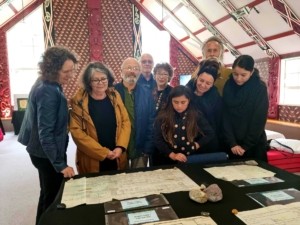- Home
- Research
- Creativity and Curation
- Mārama: Manuscripts with Memory, An intimate audience with Ngāti Kahungunu tīpuna
Mārama: Manuscripts with Memory, An intimate audience with Ngāti Kahungunu tīpuna
Mārama: Manuscripts with Memory, An intimate audience with Ngāti Kahungunu tīpuna
A prestigious Judith Binney Writing Award has ensured that a significant EIT research project seeking to preserve historical Hawke’s Bay Māori manuscripts can continue.
Research Professor David Tipene-Leach and Te Reo Māori researcher and Twist Library archivist, Waitangi Teepa, won the award, which is given by the Judith Binney Trust to support research and writing on New Zealand history. Judith Binney was a renowned New Zealand historian.
Made in December 2020 , the award will support the next phase of the project around the Henare Matua manuscripts collection of more than 1000 letters written between 1860 and 1890 in the Māori language of the mid-1800s. Work on it began in late 2019 and extended through 2020 with the archiving and cataloguing of the collection. The project has received a six-month extension of funding from Ngā Pae o Te Māramatanga. In July this year, the Judith Binney funding will see the emphasis move from the archiving of the collection to the collation of the collections data into a record of Repudiation Movement correspondence, a reconstruction of its activities in the face of the hardships of the times.
, the award will support the next phase of the project around the Henare Matua manuscripts collection of more than 1000 letters written between 1860 and 1890 in the Māori language of the mid-1800s. Work on it began in late 2019 and extended through 2020 with the archiving and cataloguing of the collection. The project has received a six-month extension of funding from Ngā Pae o Te Māramatanga. In July this year, the Judith Binney funding will see the emphasis move from the archiving of the collection to the collation of the collections data into a record of Repudiation Movement correspondence, a reconstruction of its activities in the face of the hardships of the times.
The documents in the collection represent a forgotten period in Hawke’s Bay history. Henare Matua was the leader of the Hawke’s Bay ‘Komiti’, which was based around several mid to late-19th century rangatira in the area who banded together to both prevent land sales and overturn land sales that were clandestine, fraudulent and damaging to local hapū.
The group went to court to “repudiate” some of those land sales and as a result, local landowners called them the Repudiation Movement, says David.
What sparked David’s interest is a personal connection – Henare Matua was his great, great grandfather’s oldest brother.
“Our family has had these hundreds of letters written to our tīpuna Henare, and they have been passed down through the generations since the 1860s. I have personally known about them for about 30 years.”
He obtained various parts of the collection which includes whakapapa books, journals, newspapers and business records, from an aunt and two uncles who knew he had an interest in the family history. The letters in particular, spent some considerable time in what became known the ‘black chest’ in a spare room of his grandfathers and then aunt’s home and are a part of the family legacy.
Waitangi, with previous archival experience, has catalogued and transcribed over 800 letters written to this tīpuna and others of the “Komiti”.
This award will allow Waitangi and David to move to the next phase of the project – using these manuscripts to illustrate the challenges of the mid-1800s land grab by colonial authorities and local leaseholders.
“Waitangi has all the qualifications of a marvellous archivist and reader-transcriber. I’m very much expecting similar levels of talent as we move to historical analysis and writing.”
The plan is to write a book on Henare Matua and the Repudiation Movement.
David’s work to preserve the Repudiation Paper saw him approach local historian, Pat Parsons, who has been working on a collection with the Blake whānau, whose tīpuna was John Thomas Blake. A Māori Land Court translator, Blake kept two records of the cases he translated – one for the judge and the other for his personal collection.
The Hawke’s Bay collection was split in three bits – some in the Hastings Library, some deposited with Pat by the Blake family – and many pieces are still in the wider Blake family.
David said both he and Pat believe that collections of such historic importance could well be made more accessible and therefore useful to the wider community.
David felt it was important to start work on the Repudiation Papers translation project, while another short-term task was to get the Blake Collection back together. A longer-term project, which has not begun yet, is to set up an archive where historic documents like these can be preserved, stored and used by students and history scholars.
“There were three things we have been trying to do – archive our collections, digitalise our collections and create a way for other whānau to be able to archive their own collections.”
David says the creation of an archive was facing some obstacles because of the costs involved. Significant funding is required for such a venture and David is hoping that there will be movement on the project next year. All eyes are presently focussed on the development of the Hawke’s Bay Archives and the potential role of that development for Māori.
In the meantime, the extra funding received will ensure a pivotal part of Hawke’s Bay history is preserved and cherished.
